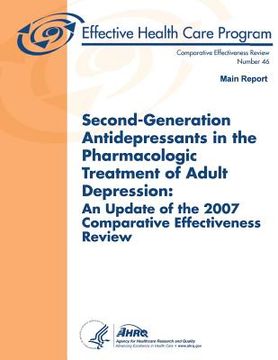Second-Generation Antidepressants in the Pharmacologic Treatment of Adult Depression: An Update of the 2007 Comparative Effectiveness Review: Main Rep (en Inglés)
Reseña del libro "Second-Generation Antidepressants in the Pharmacologic Treatment of Adult Depression: An Update of the 2007 Comparative Effectiveness Review: Main Rep (en Inglés)"
"Second-Generation Antidepressants in the Pharmacologic Treatment of Adult Depression: An Update of the 2007 Comparative Effectiveness Review: Main Report" (see also "Second-Generation Antidepressants in the Pharmacologic Treatment of Adult Depression: An Update of the 2007 Comparative Effectiveness Review: Appendices") - Depressive disorders such as major depressive disorder (MDD), dysthymia, and subsyndromal depression may be serious disabling illnesses. Pharmacotherapy dominates the medical management of depressive disorders and may include first-generation antidepressants and more recently developed second-generation antidepressants. These second generation treatments include selective serotonin reuptake inhibitors, selective serotonin and norepinephrine reuptake inhibitors, serotonin and norepinephrine reuptake inhibitors, and other second-generation antidepressants. These drugs work, in part, through their effects on neurotransmitters such as serotonin, norepinephrine, or dopamine in the central nervous system. In general, the efficacy of first- and second-generation antidepressant medications is similar. However, first-generation antidepressants often produce multiple side effects that many patients find intolerable, and the risk for harm when taken in overdose or in combination with certain medications is high. Because of their relatively favorable side-effect profile, the second generation antidepressants play a prominent role in the management of patients with MDD and are the focus of this review. This report summarizes the available evidence on the comparative efficacy, effectiveness, and harms of 13 second-generation antidepressants in treating patients with MDD, dysthymia, and subsyndromal depression. It also evaluates the comparative efficacy and effectiveness for maintaining remission and treating accompanying symptoms such as anxiety, insomnia, or neurovegetative symptoms. We address the following in this report: 1a. For adults with major depressive disorder (MDD), dysthymia, or subsyndromal depressive disorders, do commonly used medications for depression differ in efficacy or effectiveness in treating depressive symptoms? 1b. If a patient has responded to one agent in the past, is that agent better than current alternatives at treating depressive symptoms? 1c. Are there any differences in efficacy or effectiveness between immediate-release and extended-release formulations of second-generation antidepressants? 2a. For adults with a depressive syndrome that has responded to antidepressant treatment, do second-generation antidepressants differ in their efficacy or effectiveness for preventing relapse (i.e., continuation phase) or recurrence (i.e., maintenance phase) when a patient continues the drug they initially responded to, or switches to a different antidepressant? 2b. For adults with a depressive syndrome that has not responded to acute antidepressant treatment or has relapsed or recurred, do alternative second-generation antidepressants differ in their efficacy or effectiveness? 3. In depressed patients with accompanying symptoms such as anxiety, insomnia, and neurovegetative symptoms, do medications or combinations of medications differ in their efficacy or effectiveness for treating the depressive episode or for treating the accompanying symptoms? 4a. For adults with a depressive syndrome, do commonly used antidepressants differ in safety, adverse events, or adherence? Adverse effects of interest include but are not limited to nausea, diarrhea, headache, tremor, daytime sedation, decreased libido, failure to achieve orgasm, nervousness, insomnia, and more serious events including suicide. 4b. Are there any differences in safety, adverse events, or adherence between immediate release and extended-release formulations of second-generation antidepressants? 5. How do the efficacy, effectiveness, or harms of treatment with antidepressants for a depressive syndrome differ for the subpopulations?

